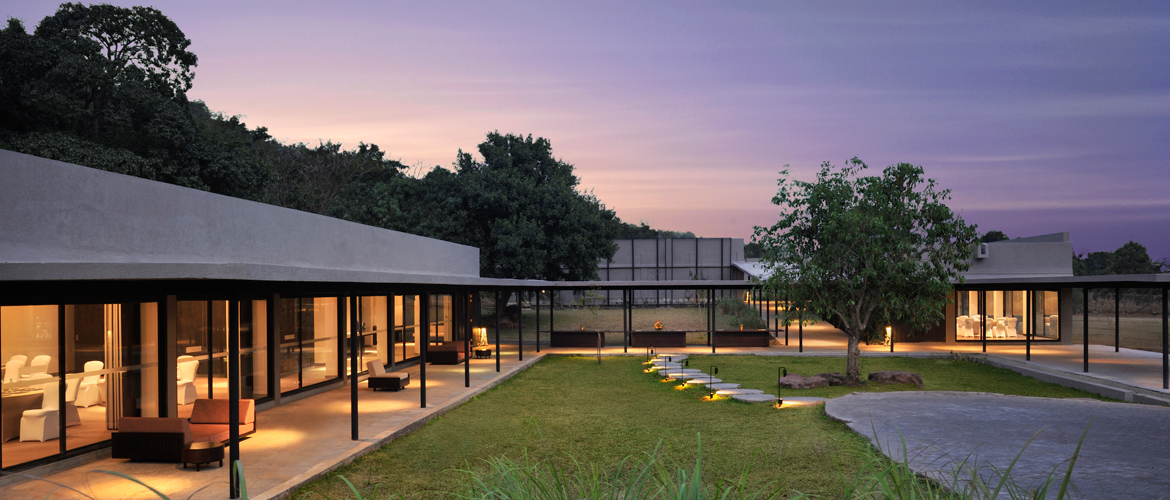Karthikesh, my yoga instructor was trying to help me perfect my Matsyasana, while I on the other

I was at Hilton Shillim, an eco-wellness retreat located in a remote village called Shillim, enveloped by the stunning Sahyadris hills that run along the west coast of India, one of the world’s hottest bio-diversity hotspots.
It was two brothers whose deep-rooted interest in conservation and education led them to aquire 2,500-acres of these mountainous lands, farm fields, and dense forests. A team of designers, engineers, horticulturalists, and ecologists were employed to help design an ecological retreat keeping in mind how to best conserve, restore, and develop the land. The team chose specific natural landscapes in to construct the suites and villas, the spa, the club, the Institute, the riding centre, and the spiritual retreat. The design and architecture was inspired by the landscape in a way that makes the entire property merge into its natural surroundings. Hill sides were revegetated, thousands of meters of contour trenches were cut through to recharge groundwater levels and cultivate new grasslands and forest. With a nursery that houses over 100,000 plants, organic farming practices were also started at the resort in 2004.

By my second day at the resort, I realized the story behind the birth of Hilton Shillim was not just all talk. Everything at the resort is focused towards sustainability—from the organic food that is sourced from their own farm or from local farmers to the natural vegetation of the area that has been left untouched unlike most resorts that are all about manicured gardens and ornamental plants.
I was assigned one of the 99 well-appointed villas, complete with a view of the hills and a private swimming pool. The day began for me with a beautiful trek up to the Shillim Peak, a gorgeous plateau about half an hour away from the resort. On the way, Prateek, the enthusiastic in-house naturalist bombarded me with names and properties of the flora and fauna of the area. He warned me about encountering snakes but fortunately I did not meet any. I was happy with the fig, almond, mango and a whole lot of other fruit trees that just grow in the wild in Shillim. I even managed to spot a few birds such as the green bee-eater, red-vented bulbul, a couple of jungle fowls and a bunch of noisy babblers with my myopia-ridden eyes.

Most of my meals were at the The Green Table Wellness Restaurant, lead by Chef Shubendhu Kadam, with two decades worth of experience in the food industry. The menu draws inspiration from Ayurveda with a special focus on super foods that detoxify and cleanse the body. Contrary to popular belief that wellness food is bland and boring, the vibrant and aesthetically-plated food presented to me took me quite by surprise. The food was nutritious yet flavourful. The emphasis is on low-calorie content, organic and seasonal produce. Special cooking techniques are used to enhance the flavours without compromising with the natural textures of food.

Post lunch afternoons were reserved at one of the 17 treatment rooms at Hilton Shillim. Mind you, this is not your regular feel-good-for-an hour spa. It is a wellness centre headed by a seasoned health professional, Mr. Arun Pillai that focuses on wholesome and sustainable well-being. They call it the ‘Dharana’ way of life that encompasses mind, body and spirit. The moment you check-in you are taken through a series of tests that measure your BMI as well as mineral deficiencies and a special programme is designed for you accordingly. It includes everything from food to the kind of Ayurvedic treatments you are to opt for during your stay. I was prescribed Shirodhara and Abhyanaga treatments that were expertly delivered by Rumi, an Assamese therapist at the spa. Before leaving, Dr. Pillai along with the nutritionist even gave me a detailed report along with a diet chart suggesting the lifestyle changes that I need to make according to my dosha.

Deepak, a lovely boy from a neighbouring village accompanied me around the sprawling resort throughout my stay. He told me about how a few decades ago, the entire area was covered in dense forests and how villagers preferred not to venture out after dark in fear of being attacked by wild animals. Now, however, the surrounding village lands are slowly being taken over by property developers, not all of who unlike the D’Souza brothers are very conscious of the ecological impact of constructing luxury villas in the Sahyadris.
wellness resorts
Ayurveda
Maharashtra


